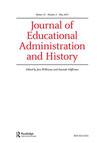理想的教育改革的可能性。加泰罗尼亚“罗莎·森萨特”运动的话语、联盟与建构
IF 1.6
Q2 EDUCATION & EDUCATIONAL RESEARCH
Journal of Educational Administration and History
Pub Date : 2023-01-03
DOI:10.1080/00220620.2022.2153813
引用次数: 1
摘要
本文分析了佛朗哥统治末期和西班牙向民主过渡时期(1965-1990)加泰罗尼亚罗莎·森萨特教师运动的案例。这个运动是那个时期教育改革辩论中的一个关键角色。基于政治过程理论的视角,本文聚焦于定义罗莎·森萨特运动的语境、组织和话语动力学,以及它在三个历史时期作为社会政治行动者的角色:(i)与持不同政见者学派相关的出现时刻(1965-1970);向民主和教育权力下放过渡的过程,其特点是公共教育改革困难重重(1970-1977年);(iii)后过渡时期,以新宪法为标志,持不同政见的学校被纳入公共体系(1978-1990),运动被边缘化。这些结论强调了它在教育改革中作为社会政治行动者的影响和随后的衰落。本文章由计算机程序翻译,如有差异,请以英文原文为准。
The (im)possibilities of an ideal education reform. Discourses, alliances and construction of alternatives of the Rosa Sensat movement in Catalonia
ABSTRACT This article analyses the case of Rosa Sensat teachers’ movement in Catalonia during the final years of Francoism and the transition to democracy in Spain (1965–1990). This movement was a key actor in education reform debates in that period. Based on the perspective of political process theory, the article focuses on the contextual, organisational and discursive dynamics that define the Rosa Sensat movement, and its role as a sociopolitical actor in three historical periods: (i) the moment of emergence, linked to the dissident schools (1965–1970); (ii) the process of transition to democracy and educational decentralisation, marked by the difficulties in reforming public education (1970–1977); and (iii) the post-transition period, marked by the new constitution, the integration of dissident schools into the public system (1978–1990) and the marginalisation of the movement. The conclusions highlight its influence and subsequent decline as a sociopolitical actor in education reform.
求助全文
通过发布文献求助,成功后即可免费获取论文全文。
去求助
来源期刊

Journal of Educational Administration and History
EDUCATION & EDUCATIONAL RESEARCH-
CiteScore
3.80
自引率
5.60%
发文量
25
 求助内容:
求助内容: 应助结果提醒方式:
应助结果提醒方式:


